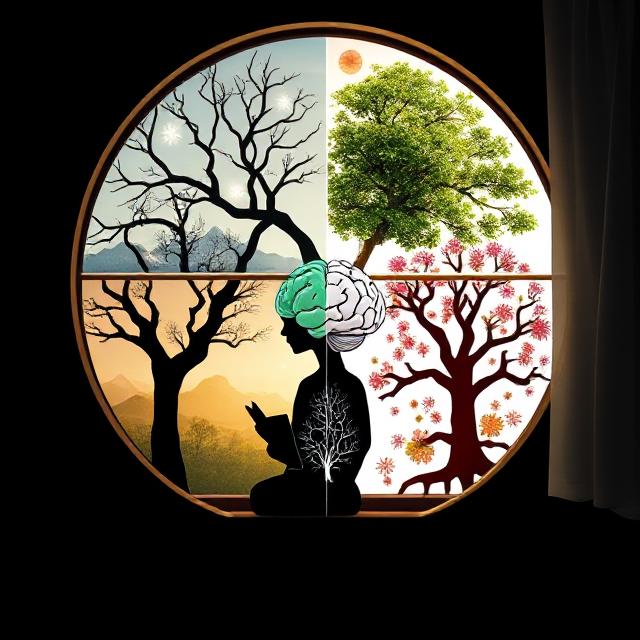
Table of Contents
Seasonal Changes & Study Performance: How to Adapt
Your ability to concentrate, retain information, and sustain mental energy isn’t fixed. It fluctuates—sometimes drastically—depending on external cues like light, temperature, and seasonal patterns. And yet, most people build study routines as if the brain works the same in July as it does in January.
It doesn’t.
Seasons affect your circadian rhythm, neurotransmitter levels, sleep quality, and even motivation and mood. To optimize study performance year-round, you need to understand how your biology adapts to seasonal shifts—and then build your learning habits to match.
This guide reveals how spring, summer, autumn, and winter each shape brain function, and how to pivot your study strategy to take full advantage of the season you’re in.
How Seasons Influence Brain and Behavior
The brain is not isolated from its environment. It receives zeitgebers—“time-givers”—from light, temperature, and social cues. These external signals regulate:
- Cortisol and melatonin (alertness vs. sleepiness)
- Dopamine and serotonin (motivation and mood)
- Core body temperature (which affects mental performance)
- Sleep-wake timing (via circadian entrainment)
- Vitamin D levels (neurochemical modulation)
These are not minor changes—they shape brainwave profiles, memory formation, and study stamina.
Winter: Focus Challenges & Restorative Learning
Challenges:
- Less daylight → reduced serotonin and alertness
- Higher melatonin → increased sleepiness
- Cold temps → decreased physical energy
- SAD (Seasonal Affective Disorder) risk
Brainwave Effects:
- Tendency toward slower alpha-theta states
- More internal, reflective processing
Best Study Tactics:
- Use full-spectrum lighting: Simulates daylight and improves mood
- Study earlier in the day: Circadian alertness peaks are shorter
- Take vitamin D or get outside midday: Natural light restores focus
- Lean into introspective study: Philosophy, writing, theory-heavy topics
Adjust Your Environment:
- Add warm lighting and colors to counter the cold
- Use a heated blanket or warm drink to reduce tension
- Keep your study space extra tidy to avoid cabin-fever distraction
Spring: Dopamine Rise & Learning Momentum
Changes:
- Increasing daylight triggers dopamine release
- Serotonin rises → better mood, motivation
- Spring cleaning = mental reset
Brainwave Effects:
- Increase in high alpha and low beta waves
- Sharper memory, better verbal fluency
Best Study Tactics:
- Start new learning projects: Great time for skill acquisition
- Use momentum-based systems like habit stacking or gamification
- Study outdoors when possible: Nature enhances working memory
- Schedule strategic reviews: Brain is primed for consolidation
Adjust Your Environment:
- Open windows to circulate fresh air
- Add bright green or yellow tones to your study room
- Switch from warm lighting to cool white to mimic spring skies
Summer: High Energy, Low Discipline
Challenges:
- Hotter temps = decreased cognitive control
- Longer days can disrupt sleep and consistency
- Social events = more distractions
- Possible burnout from overcommitting
Brainwave Effects:
- Increase in fast beta → energy and restlessness
- Drop in delta → less deep restorative rest
Best Study Tactics:
- Use Pomodoro timing with breaks in cool environments
- Study during early mornings or late evenings
- Focus on applied, hands-on tasks (experiments, building, design)
- Prioritize hydration and cooling tools (fans, ice packs, cold water)
Adjust Your Environment:
- Use blinds or blackout curtains to block excessive light
- Add calming colors like blue or sea green
- Switch to task lighting instead of bright overhead light
Fall: Cognitive Reset & Planning Focus
Benefits:
- Cooling temps = better mental regulation
- More routine = easier habit building
- Natural time for reflection and goal setting
Brainwave Effects:
- Rebalancing of alpha and beta patterns
- Stronger prefrontal cortex activity (planning, organization)
Best Study Tactics:
- Do long-form writing or strategic planning
- Use mind maps and journaling to summarize what you’ve learned
- Reinforce habits with routine-based triggers
- Focus on review and integration of previously studied material
Adjust Your Environment:
- Use muted earth tones to stabilize mood
- Gradually reduce evening light intensity
- Incorporate scents like cinnamon or cedar to improve recall and comfort
Circadian Entrainment: Lighting Across the Year
Because daylight hours shift dramatically across seasons, syncing your study lighting becomes a neuroadaptive strategy.
| Season | Morning Light | Midday Boost | Evening Wind-Down |
|---|---|---|---|
| Winter | Blue-enriched LED | Daylight bulb | Warm incandescent |
| Spring | Natural light | Indirect full-spectrum | Dim amber light |
| Summer | Soft natural + blinds | Neutral white | Red-shifted bulb |
| Fall | Neutral white | Cool task lighting | Candlelight mimic |
How to Track Your Seasonal Learning Patterns
Use a study journal or app to track:
- Hours studied
- Time of day you feel most focused
- Mood and motivation fluctuations
- Sleep quality and duration
- Weather and light exposure
Within a few weeks, patterns emerge. Some people do deep work in the dead of winter, while others bloom in spring. Adaptability beats rigidity.
Building a Seasonal Study Toolkit
Here’s how to support each season with specific tools:
Winter
- Light therapy lamp
- Heat pad
- Warm-tone planner or journal
- Vitamin D supplement
Spring
- Nature-themed calendar
- Habit tracker with rewards
- Standing desk option
- Fresh air study breaks
Summer
- Cold water bottle
- Noise-canceling earbuds
- Breathwork timer
- Cool-toned screen filter
Fall
- Long-read book list
- Mind map board
- Earth-tone ambient lighting
- Scent diffuser
Final Thoughts: Adaptive Learners Win Long-Term
Rigid study routines ignore reality. The world outside your window affects your internal rhythms more than you realize. The adaptive learner—the one who tweaks their environment and schedule to harmonize with the season—wins the long game.
Instead of fighting nature, align with it.
- When light fades, conserve mental energy and reflect.
- When energy surges, take on more and ride the wave.
- When distractions rise, return to your focus rituals.
The body changes. The mind adapts. Let your study system evolve with the season.
